Discussing All Things Fantasy, Past, Present, and Future: An Interview with Adrian Simmons and David Farney of Heroic Fantasy Quarterly
Heroic Fantasy Quarterly is an ezine dedicated to publishing short works of heroic fantasy. More than that, through both prose and poetry we hope to hearken an older age of storytelling – an age when a story well told enthralled audiences. Traits of great oral storytelling survive the ages to influence treasures of literature, the pulps, radio plays, late-night game sessions, and now Heroic Fantasy Quarterly.
So reads the “Mission Statement “of Heroic Fantasy Quarterly. Like Black Gate e-magazine, Heroic Fantasy Quarterly is one of the bright lights and a sure leader in the Fantasy genre, and always goes above and beyond to keep the genre alive, fresh, and rolling along. When John O’Neill of Black Gate asked me if I would “interview” Adrian Simmons and David Farney of HFQ, I jumped at the chance, thrilled to “meet” these two outstanding editors of such a well-respected e-zine. The result is one great interview with both gentlemen sounding in, and I hope it’s as much of a treat for fans of BG and HFQ as it was for me.
So let’s get started, shall we?
Gentlemen, what are some of your earliest influences? Who inspired you to become an editor? And perhaps even more importantly, why did you decide to become an editor?
ADRIAN: Early influences are many and varied. In the early 80s I discovered Dungeons and Dragons, and all of its clones and hybrids. I was exposed to all those early 80s swords and sorcery movies (good and bad!), and was reading the The Lord of the Rings and such. By the late 80s, in high school, I was reading the The Lord of the Rings and actually understanding most of it, and had picked up Robert Howard’s Conan books (the Ace collections, with all the post-humus collaborations), and Fritz Leiber.
As far as who inspired me to be an editor… really, by the time we started HFQ I had met quite a few editors at SF/F conventions, but I can’t honestly say that they inspired me to be one myself. I did like the idea of John Campbell (Astounding), Frederik Pohl (Galaxy) and Farnsworth Wright (Weird Tales) kind of molding their particular corner of the genre toward their own ideas (good or bad).
Why I decided to become an editor is much easier question to answer. David and I were part of a writers’ group that met in Oklahoma City. The group was fun, writing was fun, but success as a writer was (and continues to be) very slow. So David and I decided that we’d form an e-zine as something to do, as a way to promote fantasy fiction we enjoyed, and as a way to get our names out there a bit more.
DAVID: My track to HFQ follows Adrian’s almost exactly. I was introduced to Tolkien early, when I lived in North Dakota. I moved to Oklahoma City in the late 70’s. Shortly after, some kids moved in across the street and with them brought D&D. Thus began my corruption — er, true early interest in fantasy. I think D&D finally made its way to North Dakota in the 90’s! Thankfully, I arrived in a city — while still a cow-town back then, at least I was exposed to something more than baling hay, castrating pigs, beheading and plucking chickens.
As to why I decided to become an editor? I really needed a break from writing and felt I’d learned enough that I might be of some use as an editor (more on this below). More than that, though, is that I really wanted to see more short works of fantasy that reminded me of those golden years of discovery when I arrived in OKC.
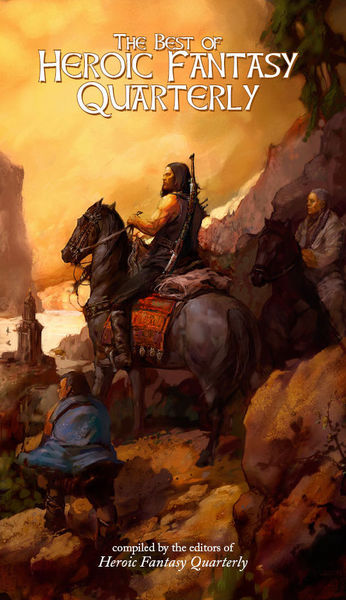 |
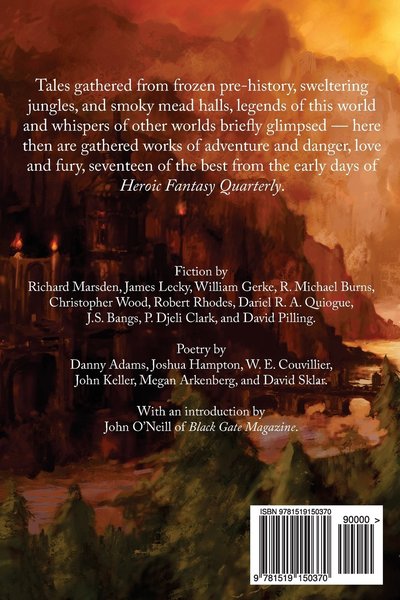 |
Heroic Fantasy Quarterly is a highly-regarded publication that is one of the leaders in keeping the genre of Heroic Fantasy not only alive and well, but moving forward. When did you first launch Heroic Fantasy Quarterly?
DAVID: That’s nice to hear, thank you; those goals were and remain a primary focus for us. We published our first issue on June 30th, 2009. I don’t recall for sure, but the HFQ site was probably launched three to six months prior so we could begin gathering our first submissions. It’s hard to believe we’re approaching our eighth anniversary! Lately, Adrian deserves the credit for that.
Can you tell us some of the plans you have for the future of Heroic Fantasy Quarterly?
ADRIAN: David and I both have full-time day jobs, and various other hobbies and interests, so in light of that, HFQ has been, since about the third or fourth issue, that perfect ratio of effort/time/hassle to satisfaction. Perfect! We’ve played it pretty cautious because it seems that so many of the other magazine editors we meet are doing so much more work for not much more reward!
That said, we did our first Best-of Collection in 2015, and it has taken a lot longer than we thought to get the funds together to make another, so we’ve started a Kickstarter campaign to urge it on — as of this writing we’ve surpassed our goal! That should enable us to speed up production of future volumes of our best-of collections.
About a year ago we started to do a thing where we’ve been getting individual stories paired with an illustration or two, and that has worked out very well so far, and we’ll be likely to continue that.
I’ve always liked the idea of having some kind of comic — maybe a monthly sort of thing like in the old Dragon Magazine, but so far, we haven’t had the right overlap of time/desire/funds to pursue it.
We’ve cracked the code of Print-on-Demand publishing, so there has been talk of doing other collections besides the best-of anthologies — collect the stories of certain re-occurring characters, for instance, or an “Asian Adventures” collection.
We could also do that kind of thing for original fiction as well, or some mix of the two. Again, it is a time/desire/funding kind of thing.
Chimera, by Giovanna Guimarães
Besides “originality” and the “entertainment factor,” what do you look for in the stories submitted to you and Heroic Fantasy Quarterly?
DAVID: In addition to those, action and tone are the characteristics that hit it for me. Remember, action can be dialogue and not just shield-bumping and swordfights. A good threat or boast will pull me right in. From there, give us an interesting character who DOES something quickly, for better or worse. No wringing of hands and pondering next moves. Which reminds me – I’d like to clarify my comment on dialogue: internal dialogue does not count as action. I can handle a tiny bit of that, but not much more. Our requirements are actually quite simple, but we understand they can be hard to pull off well.
ADRIAN: I almost want to copy and paste David’s comments as my own, because they are pretty much my views, and novice writers need to hear twice! Something has to be happening in your story.
Do you look for and/or prefer stories that are more plot-driven, than character-driven for Heroic Fantasy Quarterly? Or does that not matter as long as you feel it is a good, strong and original story?
ADRIAN: Generally, for the kind of fiction we publish, it tends to be more plot-driven. Things have to happen. Things have to be happening (and not some throw-away “look at what a badass my character is” scene).
Character-driven fantasy tends to be a bit slower, have a bit more backstory, have more, well, extraneous stuff going on. So, in a lot of ways, it is at a bit of a disadvantage with us.
The roots of Heroic Fantasy can be traced back over the centuries: Greek, Celtic and Germanic mythology, for instance. JRR Tolkien is usually cited as the man who brought the genre into the light of the mainstream eye. But there were other writers before his time and during his own lifetime, writers I grew up reading, such as William Morris, Mervyn Peake, James Branch Cabell, George Macdonald, Lord Dunsany, CS Lewis, and ER Eddison, to name a handful. All of these authors I believe played important roles in the early days of the genre. Can you share with us some other names that you feel need more exposure to modern audiences?
DAVID: Wow, great question and impressive list of your reads. You have me wanting to go find my copy of Golden Wings by Morris. At HFQ, we also consider Sword & Sorcery to be an important niche of this genre. So of course I would suggest Robert E. Howard – no one saw that coming, I know – and Michael Moorcock. Those guys will live forever in my mind, as should their works for readers to discover and rediscover now and in the future. To those I’d add Gene Wolfe and his Book of the New Sun series of novels. I understand these works are classified as Sci-Fi, but I might argue mixed-tech – of which we’ve done a couple pieces at HFQ. Wolfe is a master of not only tone, but naming, pace, plot and setting in this series. Aces!
To the Germanic — by which I assume you include Norse — (Yes, I do! My bad for not mentioning it! — JB) — I’m going to add the name Snorri Sturluson, an Icelander, who as I recall almost singlehandedly kept the Norse myths alive via The Prose Edda. Speaking of Iceland, the Sagas are not to be missed by any fan of heroic fantasy or S&S! One of my favorites which might not be as easy to find in collected editions of the Sagas is The Saga of Grettir the Strong. Again, this is must-read stuff. Penguin Classics has awesome translations of these Icelandic works that also deserve more exposure — not to mention immortality. Here are some links to those works:
The Prose Edda: Norse Mythology (Penguin Classics)
The Sagas of the Icelanders (Penguin Classics Deluxe Edition)
ADRIAN: I would point out that Gene Wolfe’s Soldier of the Mist and its sequel are excellent historical fantasies. And, since David went all Norse, I’ll go all Irish with the Táin Bó Cúailnge, the Red Branch myths and The Mabinogion.
(David, you’re impressed by my “list of reads?” The feeling is mutual! I always find it interesting when I hear about people’s “list of reads.” A lot of it has to do with age, I think. I don’t meet many 20-somethings who grew up reading The Mabinogion, The Prose Edda, or works by Mervyn Peake, HR Haggard, William Morris, and Snorri Sturluson, etc. I think there is so much fantasy out there nowadays than there was when I was a kid in the 1960s, that a lot of 19th and early 20th century fantasy often gets overlooked. And now, back to our interview — JB)
Do you think any of the authors I mentioned above may be considered too outdated for today’s target audience?
ADRIAN: Tastes change over time — that much is certain, and just about any one of those authors may not particularly stick with a modern reader. Tolkien seems to be especially hit-or-miss with people under 35. It even took me two tries to get through Dunsany’s “A Queen of Elfland”! (Indeed so! Took me a few times to get through David Lindsay’s “A Voyage to Arcturus,” and almost anything by William Morris, and James Branch Cabell. But in those days, I had more time, more patience. — JB)
I think that’s why a lot more emphasis is being given these days to the pulp-fiction adventures of Conan and his cadre, and more pulp-style stories are being written today. With the competition from video games and all the great TV, a story has to really have legs to hook a reader.
DAVID: Agreed. Not only that, but we’re also living in the time of “quick hits.” We all have devices upon which we rely too much, and upon which we spend too much time — for me, that time is mostly related to work. When I need I quick breather I’ll look for easily digestible content that doesn’t require a lot of mental commitment. This will sound bad to some, I know, but much of what we like about pulp and S&S and SF poetry AND the Sagas is that you can jump in and jump out, and pick back up easily — unlike Tolkien or Peake and others who might seem unwieldy in these days of short attentions spans.
I know that the number of series like The Game of Thrones, The Wheel of Time, Shannara, and others — even Harry Potter — are very popular, and have certainly played their parts in transforming the genres of Fantasy and Heroic Fantasy, and even adding to their popularity. But do you think such lengthy works have had or will have any negative impact on these genres?
DAVID: Speaking of unwieldy – Potter excepted – those works didn’t hold me when they came out before we had all of our current digital distractions. Some of those works were actually competing for my meager few dollars when I was buying, reading, and collecting Conan and Elric and Corum books. Even back then, I wanted my escape to be less winding and political, and more finely tuned for action, page after page. While that’s not what I look for in other genres, it happens to remain what I prefer in fantasy.
Back to your question: No, I don’t really see how those lengthy works will negatively impact the genre or sub-genre. They are what they are, right? Hugely successful and enjoyed by many. In fact, we can point to GoT and the major success it has had as a TV adaption reaching all kinds of people who probably never read fantasy to begin with, let alone the GoT novels. From there I would add that it’s my hope this visual medium increases curiosity in the written fantasy genres, and attracts new readers not only to the genre, but its subs as well. And now back to the visual: would someone please develop a live-action Elric adaption? Please! (Amen! — JB)
Back in the 1960s and 1970s, there were basically two major genres of fantasy: Heroic (in which I also call High or Epic Fantasy), and Sword & Sorcery. But over the years many new genres and sub-genres have popped up, all with their roots in Heroic Fantasy, and Sword & Sorcery: Alternate Fantasy, Magic Realism, Historical Fantasy, Romantic Fantasy, Dark Fantasy, Low Fantasy, Grimdark, Sword & Soul, for example. I know these labels are often just marketing tools, but I also know that these labels can help readers know what they’re getting into, help them make a more informed decision on what to buy, but it can all get a little confusing. As an editor, and as a reader, what are your thoughts on all these new genres? How have they helped or maybe even hurt the fantasy market?
ADRIAN: Overall, I think you summed it up when you said “these labels are often just marketing tools.” I would suppose that it has helped the more experienced readers find what they are looking for, but at the same time, if you are fairly new to genre, I can see the various divisions and tribes and subgenres being a bit intimidating. Like a menu that just has waaaay too many options.
I think I’m still informed enough to differentiate between all these new genres and what I grew up with: basically High Fantasy, and Sword & Sorcery. As an editor, as a reader, what is your take on this growing list of genres? Are they really necessary? By just reading a story without any prior knowledge of what “flavor” it is, do you know whether it’s Grimdark, Low Fantasy, or Dark Fantasy, for instance?
DAVID: Um, no. I pretty much quit paying attention to the cut-ups. I’m guessing we need fewer labels and not more, and not just in SF/F. In life.
Speaking only as an editor at HFQ and not about my other reading interests, I’ve kind of turned into that “Hey, kids — stay off my lawn!” guy. I think Adrian and others (Bill, Barbara, James — thank you all for your help) behind the scenes may be less rigid than me, and it’s all good. We all know what we like when we see it, and compare notes from there. If we agree on a piece and it happens to contain a bad angel or a vampire, we might publish it – it’s up to others to label it Dark Fantasy. Or Horror. But it will fit the heroic! (You’re preaching to the choir here, my friend. You sound like me! — Joe B)
I have my own ideas regarding what makes a story Sword & Sorcery, and what makes a story Heroic Fantasy. But just to satisfy my own curiosity, I would be very interested in your take on it all. How would you describe the differences between the two? What is your definition of Heroic Fantasy? And what is your definition of Sword & Sorcery?
ADRIAN: That’s actually a lot tougher question than most people think it is. As a general rule, heroic fantasy involves, well, a bit of heroism. A bit of self-sacrifice for the greater good and such as that. Magic may or may not be present, but it is often a bit on the muted side, if it is there much at all. Sword and sorcery is often grittier, with characters who are more mercenary. Magic is often present, and present to a much greater extent than in heroic fantasy.
The thing is, they are not mutually exclusive. In The Hobbit, which is surely a heroic fantasy, neither the dwarves nor Bilbo Baggins are going to slay Smaug the dragon because it is the right thing to do: the dwarves want their kingdom back and Bilbo wants to see a bit of the world. They are, all of them, pretty mercenary in their motivations. Conan, in “The Tower of the Elephant,” is only interested in the treasures of the tower, yet he is moved by compassion when he meets Yog-a and, inadvertently, removes a foul sorcerer from the world.
DAVID: Another great question, which is probably the undisputed best question among fans and editors alike! I can’t argue with Adrian’s response, but I would like to say that as to magic, I think S&S is easier to parse because its use there is generally antagonistic, or something to be not trusted, avoided or shunned at all costs by the protagonist/hero/anti-hero. We clearly don’t see this with Tolkien — regarding Bilbo, we see him both accepting and rejecting Sting, the Ring, and Gandalf the entire way. Conan would have none of that.
What advice would you, as an editor give to those out there who are just starting to write, and to those who have been writing and even publishing for a while?
DAVID: For those just starting to write — this includes those who have been writing for years, in isolation as we writers sometimes prefer — get out of your shell and find a group that can give you honest and CONSTRUCTIVE feedback. These people are not your best friends. They are not your family — well, unless you’re related to me… my family wore me out and laughed at some of the badness of my early stuff. Deservedly. For those who’ve been writing for a while and who have a good review group, I’d suggest spending the money on a freelance editor. I’ve spent money on two of the latter and, while it didn’t ultimately land me a book deal, I learned a ton. One of these people I met in person and therefore trusted, the other I confess to getting flat lucky with her assignment to me — what’s up Geraldine? You. Are. The. Best.
ADRIAN: My advice is more for the novices out there. I’ve taught taekwondo off and on since the 90s, and we start small and build up. We say to our students “do the kick this way.” But in writing? With writing it seems that you are expected to re-invent the wheel. There is no shame in studying the craft and learning how to get all the pieces to work.
I know people who have never written so much as a block-style business letter and then one day they start on a novel. You couldn’t have done a few random scenes first. Three people talking while they are setting a table?
And you’d be surprised how many people can’t pull that off! In three paragraphs you can’t tell what character is talking or where they are in space.
Which authors, living or dead, would you recommend to anyone with aspirations of becoming a writer?
ADRIAN: This may sound a bit flippant, but just about any will do. Whoever gets you to studying the art of writing, and dissecting how to make it work. At the end of the day, it seems to me, that who you are imitating (or borrowing from, or tipping the hat to) is less important than the fact you are actually doing the work of writing (and re-writing) to do it.
Do you do any fiction writing yourself? If so, in what genres, other than Heroic Fantasy, do you work in or would like to work in?
DAVID: Not lately. I wrote every early morning and every evening for eight years straight, this on my HF novel and the many re-writes involved. (See above, re: freelance editors.) After that, Adrian and I formed HFQ, and my day-job has been mentally taxing me ever since. That or I’m just in mid-life. What I have found and enjoy and can make mental time for is SF/F poetry; I’m fortunate to have a good job and am rediscovering the joys of writing for writing’s sake. As more than one writer told me: there are much better ways to make a living. I’m back to the joy, when I have the mental strength. (My physical is fine, thanks for asking.)
ADRIAN: I am still dabbling in writing — short stories pretty much exclusively. I’m a sci-fi and fantasy guy. I may, once every two years or so, try a mainstream type story, but my heart rarely is in it.
I guess in about 2014 we gave ourselves the go-ahead to publish a little of our own stuff at HFQ (offering them as a fourth story, so we didn’t knock anyone out of the three other fiction slots). Most of my fantasy work is at HFQ, but I’ve had a decent amount of luck with science-fiction at other magazines.
Who are some of your favorite authors, living or deceased?
ADRIAN: There are so many! I’m going to start off with living writers. I am lucky enough to know James Gunn, one of the last of the “old school” sci-fi writers form the 50s. His This Fortress World and The Listeners, and his new one (that came out in 2015) Transcendence is very good — I haven’t read the sequel Transgalactic yet. Mel Odom writes a lot of great stuff, his The Rover is good heroic fantasy, and his book Hunters of the Dark Sea.
Kij Johnson, a student of James Gunn, has a lot of great work, in her Japanese Fox Woman/ Fudoki series and she hits the Lovecraft tone with The Dream Quest of Vellitt Boe.
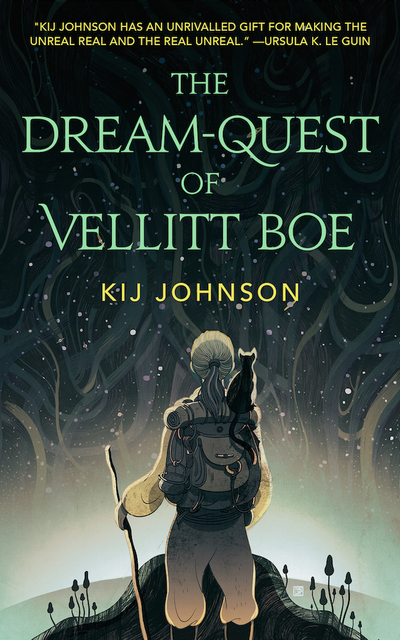 |
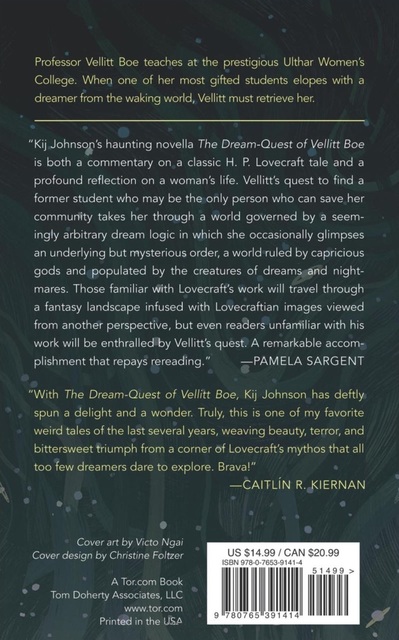 |
Mark Finn, of Skelos and REH biography, has great work with Road Trip and even his practice work in the The Sam Bowen Chronicles is very good. (Yes, I know and have great respect for Mark, although we’ve never actually met, we’ve “talked” via Facebook. We both have stories in Janet Morris’ Heroic Fantasy anthology, Heroika: Dragon Eaters, and may share covers in a few other anthologies in the coming future. — JB)
Patrice Sarath has great work in her Gordath Wood Series, and The Unexpected Miss Bennet.
Deceased writers, as can be imagined, I like the standard set: Tolkien, Robert Howard, and H.P. Lovecraft.
There are many, many more authors writing Heroic Fantasy today than I’ve seen in the last fifty years. Who are some of the bright lights and rising stars in the genre today?
DAVID: Sadly, I haven’t been paying much attention in recent years. Work and personal demands seem to have taken up so much time and energy that I’m finding myself doing lots of middle-aged-Dad stuff that doesn’t require putting in any real thought. Yep, like watching sports while cooking. I mean, I’m not even making time to watch genre movies or series. I only just discovered that one of favorite historical novel series has been adapted by Netflix. They are calling it The Last Kingdom, which is the title of the first book in the series. Written by Bernard Cornwell, the print version is known as the Saxon Chronicles. While not fantasy, these novels ring every heroic bell and are superbly written. The last up-and-comer to hit my HF radar was Joe Abercrombie with his First Law Trilogy.
Please do pass along your own recommendations to not only serve knuckleheads like me, but also readers who may be looking.
ADRIAN SIMMONS: At HFQ we have a lot of great writers and poets, and I fully expect some of them to bust out in a big way. Cullen Groves does double-duty as a poet and writer and his skills will eventually get him a high level of notice. Seamus Bayne is also a great writer. We’ve published a lot of poetry by Mary Soon Lee, and I wouldn’t be surprised if she were to break out.
What else can you tell us about yourself and your personal reading habits? Do you read any other genres besides fantasy?
ADRIAN: Yes. In fact, since I have to read so much fantasy for HFQ, I tend to not read it in my free-time. As a general rule, I try to read one non-fiction book for every two fiction books I read. I’ve been reading a lot of late 60s science-fiction, and have finally discovered Robert Silverberg through his Downward to the Earth novel.
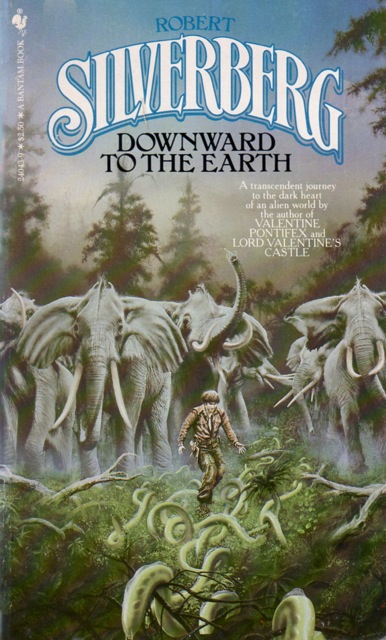 |
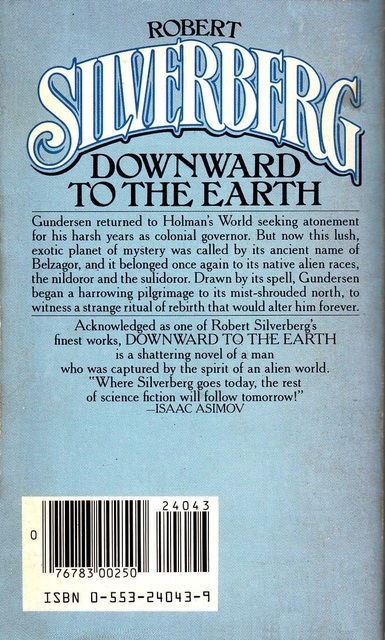 |
DAVID: In keeping with the middle-aged-Dad demographic in which I’m apparently mired, my book-length reading has been exclusively in the non-fiction category. As brain-dead as I feel after work and on the weekends, I do remain a pretty curious person and enjoy learning. I’m currently reading The Stone of Kings: In Search of the Lost Jade of the Maya, by Gerard Helferich. Fascinating, and recommended.
Finally, for all the newcomers out there who may be interested, can you tell us how they can subscribe to the Heroic Fantasy Quarterly e-magazine?
DAVID: No need to subscribe because HFQ is FREE to read; just stop by every three months to see what’s new! Savvier readers might be able to establish an RSS feed — or whatever that’s called — to receive new content alerts. I’m definitely not the right guy to ask about that. Adrian?
ADRIAN: Yes… I think it an RSS feed. It isn’t that hard keeping up with us. If one had a Facebook account, one could follow us there.
Adrian and David, I thank you both very much for a wonderfully insightful as well as such a fun interview. This was a real pleasure for me, and I thank you both for taking part. It is always a pleasure to meet people who cut their teeth reading the same books I read. Good luck to you both, and continued success with Heroic Fantasy Quarterly. — Joe Bonadonna
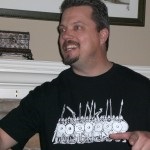 David Farney studied architecture and science in college before earning a journalism degree. He works in medical sales and enjoys writing epic and historical fantasy, as well as speculative poetry.
David Farney studied architecture and science in college before earning a journalism degree. He works in medical sales and enjoys writing epic and historical fantasy, as well as speculative poetry.
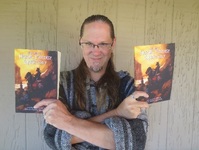 Adrian Simmons lives in Norman, Oklahoma. He has hoofed the Ouachita and Ozark Highlands trails, the England coast to coast trail, and the Camino de Santiago in Spain.
Adrian Simmons lives in Norman, Oklahoma. He has hoofed the Ouachita and Ozark Highlands trails, the England coast to coast trail, and the Camino de Santiago in Spain.
His nonfiction has appeared in Black Gate and Strange Horizons. His fiction has popped up in James Gunn’s Ad Astra Magazine, Outposts of Beyond, Plasma Frequency and the anthologies Apotheosis and No Sh!t There I Was.
In 2009 he founded the webzine Heroicfantasyquarterly.com and currently serves as 1/3 of its editorial staff.
Joe Bonadonna’s last article for Black Gate was his review of T.C. Rypel’s Dark Ventures.










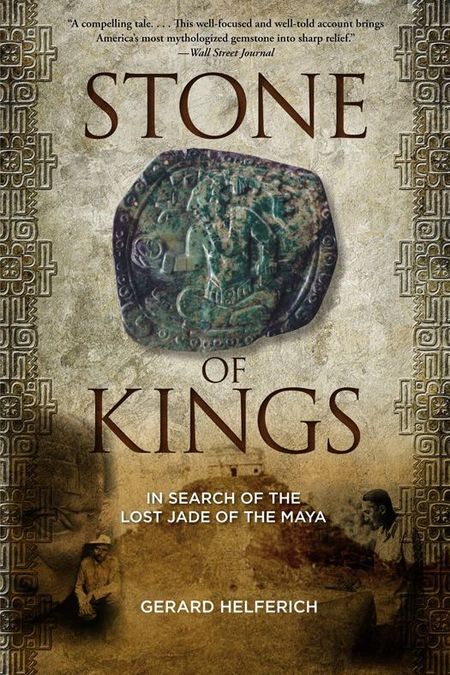
Ugh… I just realized that I didn’t get a couple of book titles worked in. This is how the sausage gets made! When I have something I need to get back to I mark it with double question marks (??). And it appears that I never got back on Mel Odom’s titles.
That would be “The Rover” series, and the stand-alon “Hunters of the Dark Sea”.
Thanks for the clarification… I updated the text (and added a few more images while I was at it!)
Hah! Thanks, John, on both counts. Although I am of the school of thought that believes if one can link to a Frezetta cover, one should!
https://www.google.com/search?q=downward+to+earth+frazetta&source=lnms&tbm=isch&sa=X&ved=0ahUKEwj99_Hn3qbUAhVM9IMKHWwaAFYQ_AUIBigB&biw=1366&bih=640&dpr=1#imgrc=SekNzJfNVlyEtM:&spf=1496666982653
Adrian,
Good point! To make up for my faux pas, here’s Frazetta’s original art for DOWNWARD TO THE EARTH.
Joe, you had mentioned that it took you a while to get through David Lindsay’s “A Voyage to Arcturus,” and almost anything by William Morris, and James Branch Cabell.
Yeah, sometimes some of the older writers are not easy. I’ve tried to read Clark Ashton Smith, but honestly, he’s pretty boring!
Thanks to Adrian and David for helping to keep quality heroic fantasy and sword and sorcery going. My own company, Dream Tower Media, through the publishing wing, Dream Tower Press, will soon be making an announcement about contributing to the quality literature in the fantasy field. And, Edgar the Raven and I are doing our best to support it through Literary Wonder & Adventure Show, on which we are seriously considering inviting Adrian and David as guests sometime in the future. Here’s wishing for many more successful years of Heroic Fantasy Quarterly!
Adrian, yes, some of those older works can be dense reads, like War and Peace, and Moby Dick. Different eras, different lifestyles, a different pace to the rat race. It took me a while to get into Eddison’s “The Worm Ourobrous,” too, but once I did — wow, what a great story!